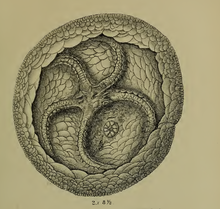Edwin Tulley Newton
Edwin Tulley Newton FRS FGS FZS (4 May 1840 – 28 January 1930) was a British paleontologist.

Newton originally worked at handicrafts, but was able to attend Thomas Henry Huxley's lectures and by 1865, was appointed as his assistant. In 1882, he became a paleontologist to the "Geologic Survey", a position he retained until 1905. His early work included microscopic sectioning of coal and notable studies on cockroach brains.[2]
Later, he did work on chimaeroid fish fossils.[3] In 1893, Newton won the Lyell Medal. He was the president of the Geologists' Association in 1896–1898 and the president of the Palaeontographical Society from 1921 to 1928.[2] Newton was elected Fellow of the Geological Society in 1873, Zoological Society of London in 1885, and Fellow of the Royal Society in 1893.[4]
References
[edit]- ^ Sharman, G.; Newton, E.T. (1892). "On a new form of Agelacrinites (Lepidodiscus Milleri, n. sp.) from the Lower Carboniferous Limestone of Cumberland". Quarterly Journal of the Geological Society. 48 (1–4): 150–152. doi:10.1144/GSL.JGS.1892.048.01-04.13. S2CID 128582521.
- ^ a b w., A. S. (1932). "Edwin Tulley Newton. 1840-1930". Obituary Notices of Fellows of the Royal Society. 1: 4–7. doi:10.1098/rsbm.1932.0002.
- ^ Newton, E.Tulley (1876). "On two Chimaeroid Jaws from the Lower Greensand of New Zealand". Quarterly Journal of the Geological Society. 32 (1–4): 326–331. doi:10.1144/GSL.JGS.1876.032.01-04.38. S2CID 129831222.
- ^ "NEWTON, Edwin Tulley". Who's Who. Vol. 59. 1907. p. 1300.
- ^ International Plant Names Index. E.T.Newton.
External links
[edit]- Works by Edwin Tulley Newton at the Biodiversity Heritage Library
- Works by Edwin Tulley Newton at Open Library
- Works by or about Edwin Tulley Newton at the Internet Archive
